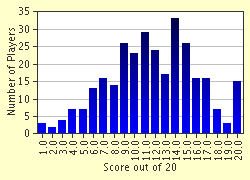Quiz Answer Key and Fun Facts
1. Three of these four types of behaviour are "not the done thing" in Japan". Which is the remaining one that is "common practice"?
2. Which of these types of trains is the fastest?
3. In the area of Gifu there is a local tradition that fishermen train a certain type of bird for the catching of such fish as trout and 'ayu'. Which birds are used?
4. Who was the author of the famous story of Genji (manuscript from 12th century)?
5. What kind of game is pachinko?
6. 'Washi' is a very special quality of paper in Japan. Which of these is not a characteristic of 'washi'?
7. In which art did all of these earn themselves a great reputation: Hokusai, Harunobu, Hiroshige, Kiyonaga?
8. A very frequent sight in Japan are the so-called 'Inaari-foxes', a kind of religious statue. Those foxes wear bibs! What colour are those bibs?
9. Which of these Japanese words is a synonym for 'samurai'?
10. What is the English equivalent of the Japanese phrase: 'Smith-san'?
11. Which of these Japanese foodstuffs is actually a type of young fern?
12. There are various varieties of noodles. Which of them is the buckwheat variety?
13. What type of music instrument is the samisen?
14. Alongside roads in Japan, especially in the North Nagano area you time and again may find so-called 'Dosojin stones'. What do they represent?
15. Which of these types of behaviour is the only one that is NOT frowned upon in Japan?
16. Which of these types of behaviour is the only one that is socially acceptable in Japan?
17. Which of these is not a typical subject of Japanese manga (cartoons)?
18. Of which of these Japanese martial arts does the name literally mean (fighting with the) empty hand?
19. With what part(s) of their bodies may sumo-wrestlers touch the ring during their fight?
20. With what does the 'gyoji' or referee of a sumo wrestling match signal the start of the fight?
Source: Author
flem-ish
This quiz was reviewed by FunTrivia editor
minch before going online.
Any errors found in FunTrivia content are routinely corrected through our feedback system.
